Related Research Articles

Alexander Aleksandrovich Alekhine was a Russian and French chess player and the fourth World Chess Champion, a title he held for two reigns.

José Raúl Capablanca y Graupera was a Cuban chess player who was the third world chess champion from 1921 to 1927. A chess prodigy, he is widely renowned for his exceptional endgame skill and speed of play.
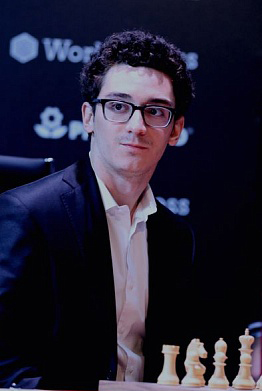
The US Chess Championship is an invitational tournament organized by the United States Chess Federation to determine the country's chess champion. It is the oldest national chess tournament. The event originated as a challenge match in 1845, but the champion has been decided by tournament play under the auspices of the USCF since 1936. The tournament has fluctuated between a round-robin tournament and a Swiss system. From 1999 to 2006, the championship was sponsored and organized by the Seattle Chess Foundation and featured a larger body of competitors, made possible by the change to a Swiss-style format. After the Foundation withdrew its sponsorship, the 2007 and 2008 events were held in Stillwater, Oklahoma, still as a Swiss system, under tournament director Frank K. Berry. The Saint Louis Chess Club has hosted the championship since 2009. Since 2014, the championship has used a round-robin format. The event is often a Zonal tournament for the United States Chess Federation, providing qualifier spots to the Chess World Cup.

Reuben C. Fine was an American chess player, psychologist, university professor, and author of many books on both chess and psychology. He was one of the strongest chess players in the world from the mid-1930s until his retirement from chess in 1951. He was granted the title of International Grandmaster by FIDE in 1950, when titles were introduced.

Samuel Herman Reshevsky was a Polish chess prodigy and later a leading American chess grandmaster. He was a contender for the World Chess Championship from the mid-1930s to the mid-1960s: he tied for third place in the 1948 World Chess Championship tournament, and tied for second in the 1953 Candidates tournament. He was an eight-time winner of the US Chess Championship, tying him with Bobby Fischer for the all-time record.

Irving Chernev was a chess player and prolific Ukrainian-born American chess author. He was born in Pryluky, Ukraine, then a part of the Russian Empire and emigrated to the United States in 1905. Chernev was a national master-strength player and was devoted to chess. He wrote that he "probably read more about chess, and played more games than any man in history."

Arnold Sheldon Denker was an American chess player and author. He was U.S. champion in 1944 and 1946. In later years he served in various chess organizations, receiving recognition from the United States Chess Federation, including in 2004 the highest honor, "Dean of American Chess".
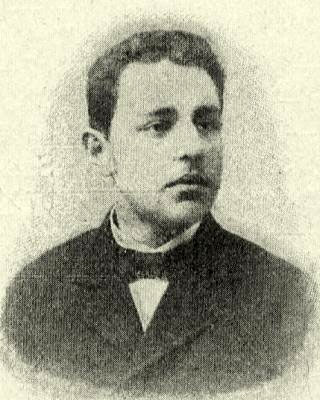
Ossip Samoilovich Bernstein was a French chess player and businessman. He was one of the inaugural recipients of the title International Grandmaster from FIDE in 1950.

Robert James Fischer was an American chess grandmaster and the eleventh World Chess Champion. A chess prodigy, he won his first of a record eight US Championships at the age of 14. In 1964, he won with an 11–0 score, the only perfect score in the history of the tournament. Qualifying for the 1972 World Championship, Fischer swept matches with Mark Taimanov and Bent Larsen by 6–0 scores. After winning another qualifying match against Tigran Petrosian, Fischer won the title match against Boris Spassky of the USSR, in Reykjavík, Iceland. Publicized as a Cold War confrontation between the US and USSR, the match attracted more worldwide interest than any chess championship before or since.

The Mechanics' Institute Chess Club is a chess club in San Francisco, California, United States. Hosted at the Mechanics' Institute, it is the oldest continuously operating chess club in the United States.
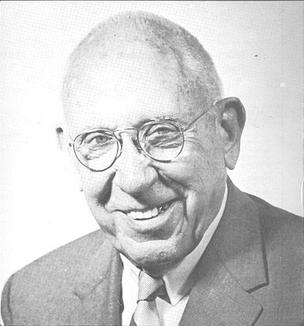
Norman Tweed Whitaker was an American International Master of chess, a lawyer, a civil servant, and a chess author. He was convicted of several crimes, was disbarred from the practice of law, and served several terms in prison. His most infamous criminal escapade was a confidence trick involving the Lindbergh kidnapping in 1932.

Isaac Kashdan was an American chess grandmaster and chess writer. He was twice U.S. Open champion. He played five times for the United States in chess Olympiads, winning a total of nine medals, and his Olympiad record is the all-time best among American players.

Abraham Kupchik was an American chess master.
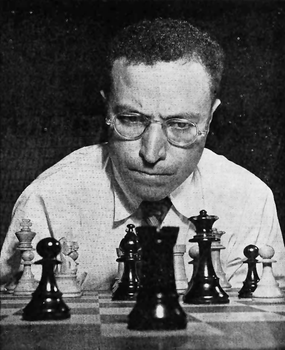
Anthony Edward Santasiere was an American chess master and chess writer, who also wrote extensively on non-chess topics. Santasiere was a middle school mathematics teacher by profession. Santasiere won the 1945 U.S. Open Chess Championship, four New York State championships, and six Marshall Chess Club championships. He competed in four U.S. Chess Championships, with his best finish being a tie for third in 1946. He was a chess organizer.

Charles Jaffé (Jaffe) was a chess master and chess author born in the Russian Empire.
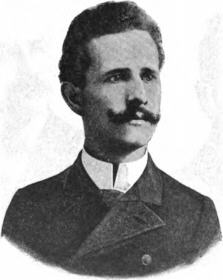
Hermann Helms was an American chess player, writer, and promoter. He is a member of the United States Chess Hall of Fame, organized as part of the World Chess Hall of Fame.
George Nelson Treysman was an American chess Master.

The Marshall Chess Club, in Greenwich Village, New York City, is one of the oldest chess clubs in the United States. The club was formed in 1915 by a group of players led by Frank Marshall. It is a nonprofit organization and a gold affiliate of the United States Chess Federation.
Events in chess in 1962:
Alexander Kevitz was an American chess master. Kevitz also played correspondence chess, and was a creative chess analyst and theoretician. He was a pharmacist by profession.
References
- 1 2 Wall, Bill (2008). Manhattan Chess Club. Retrieved on 2009-08-03 from https://web.archive.org/web/20090729175601/http://geocities.com/SiliconValley/Lab/7378/manhat.htm. Briefly lists milestones in club's history, and successive premises
- 1 2 3 Golombeck, 1977
- ↑ Brady, Endgame, pp. 39-40
- ↑ "Manhattan Chess Club". IM Mark Ginsburg Presents A Personal Chess History. Retrieved 2024-07-01.
- ↑ Barden, Leonard, The value of blitz chess, The Guardian, 4 October 1971
- ↑ Billy Colias Midwest Master. Moon Township, PA: Chess Enterprises. 1996. p. 153. ISBN 0945470568.
- ↑ "Billy Colias". chessgames.com. Retrieved September 21, 2021.